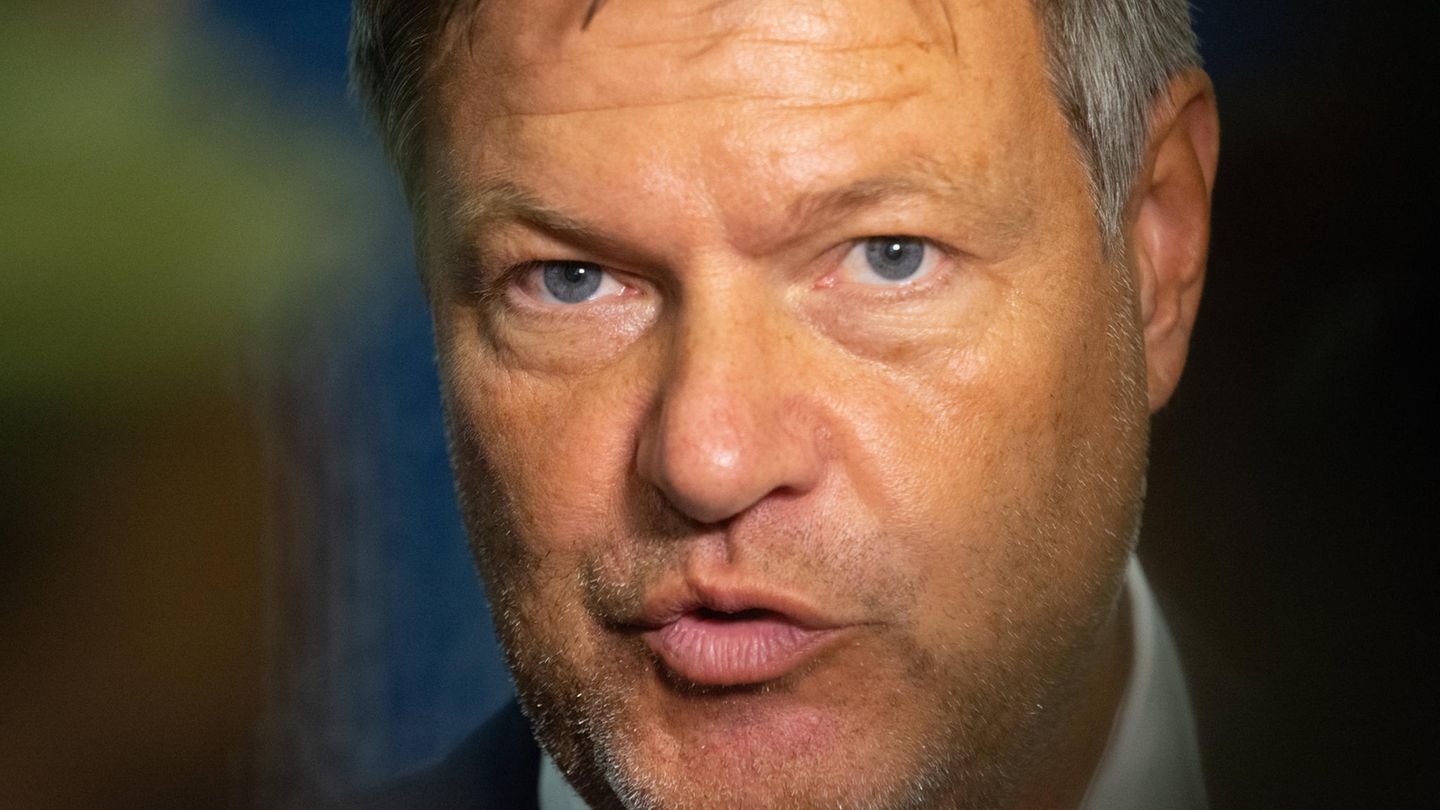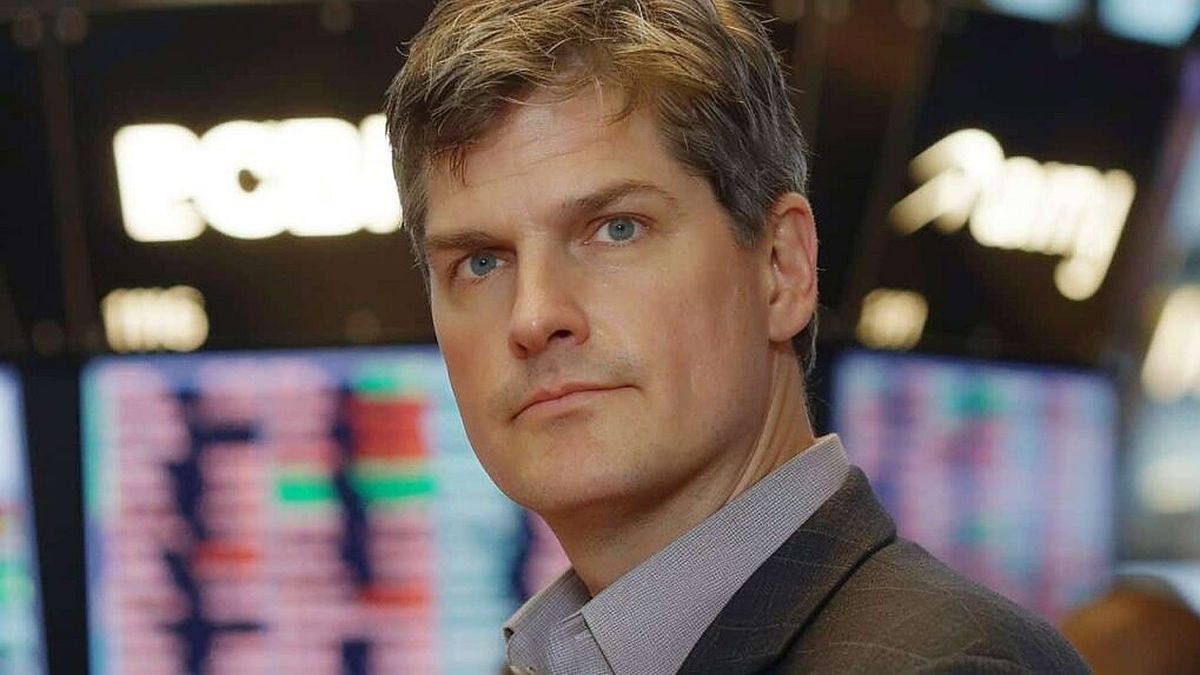Something is moving with the Greens. Robert Habeck could be one step closer to his goal. If only it weren’t for his own baggage.
On a memorable day in the history of the Green Party, Vice Chancellor Robert Habeck tunes into the “Heute-Journal” in the evening. It is Wednesday and in the morning the two party leaders Ricarda Lang and Omid Nouripour resigned from their positions early.
Habeck interpreted the event on ZDF in the evening as follows: “Ricarda Lang and Omid Nouripour did something very, very rare today.” In a difficult situation, they had “given the party a chance” to now “make a fresh start”. Many in the party see it the same way as the Minister of Economic Affairs: within a very short space of time there were four hard defeats in the European elections and the state elections in Saxony, Thuringia and Brandenburg. The party watched helplessly, didn’t know how to counteract this, and immersed itself in the migration debate and the budget dispute. A new dynamic could now emerge, at least that is the hope of many MPs.
How can you change a mood? How and with what topics can new energy be created? This is perhaps what Habeck himself has the greatest interest in: He, who caused serious damage to the Greens with the initially unsuccessful heating law, wants to lead the party into the next federal election. Annalena Baerbock snatched the job from him last time, but now she has already declared her resignation – the path is clear for Habeck.
But the starting position is different than it was back then, as Habeck has made that clear again and again recently. Much more difficult for the Greens, who were flying high at the time, are now badly shaken and are still at a loss as to what they should do to counter the numerous attacks, defeats and the uncertainty regarding the content. Habeck has another problem: He cannot be sure whether his party will rally behind his ultra-pragmatic course as he would like. But first things first.
The party is getting a new leadership – which should strengthen Habeck
Who will succeed Lang and Nouripour? One name immediately came to mind: Franziska Brantner, Parliamentary State Secretary in the Ministry of Economic Affairs. She is considered one of Habeck’s close confidants. She is given a great chance of becoming party leader together with another person, probably from the left wing.
Even before Lang and Nouripour withdrew, it had become apparent that the Baden-Württemberg native was apparently supposed to lead Habeck’s election campaign. This also expressed distrust of the party headquarters and the political director there, Emily Büning, who organized the election campaigns and had been criticized since losing the European elections in June. Together with Lang and Nouripour, the entire party executive committee, which Büning was also a member of, resigned.
With Brantner, a pragmatist would move into the party headquarters who shares Robert Habeck’s vision: The Greens must move even more towards the center. Habeck is likely to bind the party headquarters more closely to himself with a confidant at the top.
It looks as if Habeck is partly taking Joschka Fischer, the former foreign minister of the red-green coalition, as a role model. Fischer, who was also Vice Chancellor under Gerhard Schröder like Habeck is today, secured access to the party during his time in government through confidants in its leadership. Soon after the 1998 federal elections, the previous chairmen Gunda Röstel and Antje Radcke left their positions. Fischer, who did not particularly appreciate either of them, was not uninvolved in their dismantling in the background. They were followed by Fritz Kuhn, a close confidante of Fischer, who from then on led the party together with the party leftist Renate Künast.
In this constellation, Fischer avoided the reputation of a secret chairman who wanted to avoid the concrete efforts of a leading party office: he was elected to the newly created party council, which thus became a kind of strategic center for the Greens. Nevertheless, he only cared about the party to the extent that it seemed beneficial to the work of the government and tolerable for himself. The rest was done by others he could rely on. The calculation worked: in 2002, the popular Foreign Minister not only secured a significantly improved election result for the Greens (slogan: “Foreign Minister, Green on the inside”), but also ensured the re-election as Chancellor for his coalition partner Gerhard Schröder.
Message: the optimistic pragmatist – some are already fleeing
New staff at the party leadership should also be accompanied by a different strategy. There will be a “very honest debate about who we want to be” at the party conference in mid-November, said Habeck. The course is clearer than the Vice Chancellor portrays: He wants to compete as an optimistic pragmatist. In the “Heute-Journal” Habeck put it this way: The Greens would do what the country needs, namely “not just sit it out or marvel at problems,” and do so with an “attitude of wanting to succeed and being able to succeed.”
While hardly any Green party would disagree with this statement in its abstractness, the words represent the course that Habeck has already sworn the Greens to take in government responsibility. And which annoys many on the left wing – even if the members of the Bundestag were rather tame throughout the government and supported numerous compromises.
Now there is a movement: the Green Youth has apparently come to the conclusion that nothing will change in the party’s course in the foreseeable future – no matter how strongly they criticize it. On Thursday morning, the board members of the Green Youth announced their resignation from the party. They want to found another, left-wing youth organization.
The two co-spokeswomen of the Green Youth, Svenja Appuhn and Katharina Stolla, justified their withdrawal with the party’s content orientation: “The Greens came into power to make the world a better place,” they wrote. “However, the party has continued to adapt in its actions.”
Robert Habeck carries his own ballast with him
The withdrawal shows that even if Habeck determines the course, that does not mean that sensitive debates will not flare up in the coming period. Numerous questions remain unresolved, for example when it comes to migration. Many members look at this completely differently than Habeck. This was recently shown in an open letter from the grassroots against the current migration policy.
And he also carries his own baggage as a candidate for chancellor: one of the biggest problems for the Greens is the so-called “heating law,” and that came from his house. For some in the country it seemed to confirm the worst prejudices against the Greens, but it was a welcome treat for the opposition. It will always be linked to his name. Is this a “new beginning”?
That probably depends on what exactly you mean by that. Whether Robert Habeck and the Greens can bring about a turnaround in this way remains to be seen – even if at least something is moving now.
Source: Stern
I have been working in the news industry for over 6 years, first as a reporter and now as an editor. I have covered politics extensively, and my work has appeared in major newspapers and online news outlets around the world. In addition to my writing, I also contribute regularly to 24 Hours World.




